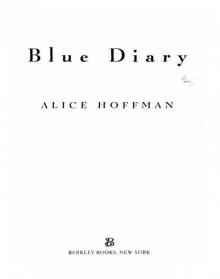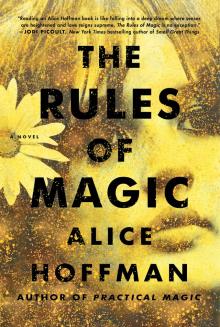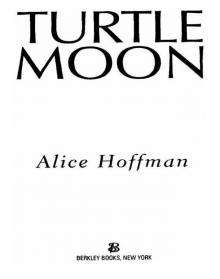- Home
- Alice Hoffman
Here on Earth Page 7
Here on Earth Read online
Page 7
If you wanted to, you would, he kept saying. If you loved me, you’d do it.
Each night he sounded more bitter. Each night, his disappointment grew. Finally, March called the Lyon to discover that Hollis had moved out. After Gwen was born, March was so distracted, in such a milky trance, that she was able to keep herself from thinking about him. By the time she admitted to herself how much she wanted him, he had married Belinda and it was too late to do anything other than sit beside the lemon tree and cry, then go and wash her face before the baby woke from her nap.
“I’ll be home before you know it,” March tells Richard now.
It’s the oddest thing—she feels as though she is lying, and she’s not. He’s so far away, that’s the problem. She’s more connected to whatever is close by—the teakettle whistling in the kitchen, the first star in the sky.
“Five days tops,” she says. “We’ll go over the estate, pack up the house, and we’re gone.”
It takes Richard a long time to answer, as if the distance between them has somehow slipped them into different time warps.
“I don’t know.” Richard is stretched out on his bed, but he might as well be floating through space. “I worry about you being there.”
“Well, don’t.” March can barely hear him now. It must be the connection, or the disparity between a starry night and a bright afternoon. “I love you,” she tells her husband, but her voice sounds wavery, as if she needed to convince either him or herself.
After March hangs up the phone, a dog somewhere on the other side of Fox Hill begins to howl. Looking out the window, it’s possible to view a vista that appears to reach on without end; it’s as if she can look across the darkness into another universe.
“Did you want milk and sugar?” Gwen calls from the kitchen, where she’s fixing the pot of tea. When there’s no answer she goes to the doorway and sees her mother with her coat still on, standing by the phone. “Mom?”
“You know what?” March says. “I’m too tired for tea. You have it. I’m going to bed.”
Not that she could sleep if she tried. Not in this house. When March goes to her room, she sees the same quilt, fashioned of red and white squares, that was on her bed when she used to think about Hollis. It was as if his image had been implanted inside her eyelids; she carried him with her night or day, eyes opened or closed. She thought about Hollis so much you’d guess there’d be nothing left to think, but here she is, doing it all over again.
It started with all that kissing out on the roof, on hot nights when they couldn’t sleep. In the morning, they’d always pretend nothing had happened. They avoided each other or were overly polite; sometimes, they did manage to forget for an hour or two, long enough to go swimming at Olive Tree Lake, where they raced against each other in the deep water for hours, as though they were nothing more than friends.
When Henry Murray died, at his desk, in his office on Main Street, everything in the house went black for two weeks. All the mirrors were covered with old sheets, and the door was left open so visitors could stop and pay their respects. March mostly remembers sitting in a corner and watching neighbors arrive with bouquets of lilies and platters of food. Once, Hollis sat down beside her. He didn’t own a suit, and was wearing jeans and a white shirt; when he tried to take March’s hand, she pulled away from him. Hollis took up so much space, and at that moment, March had no room for him. But with Hollis it was all or nothing, always. He was sulky and nasty-tempered for days afterwards, leaving March to feel guilty—about what exactly, she was never quite sure.
She should have learned her lesson then; it was so easy to wound him and so very difficult to make amends. She didn’t search him out to apologize for slighting him until several days later, when the house had cleared out. But when she knocked on his door, he didn’t answer; his belongings were no longer in the bedroom closet or stored in the oak dresser. Alan had decided that Hollis had best move up to the attic, seeing as how he wasn’t a member of the family—he was really, Alan reminded Hollis, nothing at all—and that was where March found him. He was sitting on his bed, under the eaves, where a spider was hard at work on its web. The air was close up here, and filtered through a haze of dust, so that everything you looked at seemed silvery and swirling.
“What do you want?” Hollis said. He had a hard, annoyed tone, and he gave her one of his stares, a mean, superior look that could make almost anyone feel like an idiot.
It was best not to talk to Hollis when he got like this. March sat down on a wooden stool and picked up a book from a box of her father’s law books that was being stored up here. Criminal Procedure. She wondered if criminals had the same talent she did: to appear to be doing one thing—leafing through an old, dusty book—white you were really doing something else completely inside your mind. In March’s case, she was imagining that she was kissing Hollis as she sat there and dust floated by.
There was a sharp, stinging odor in the attic, as if a trail of sulfur had been poured over the wide pine floorboards. It was probably the scent of fury, which, in Hollis’ case, was often overpowering. The heat had a heavy, yellow cast, and it was oddly exhausting. Hollis lay down on his metal bed and turned his face toward the wall. There were squirrels nesting on the other side of the plaster; their feet skittered back and forth, like drumbeats inside the eaves.
“Go away,” Hollis said. “Get lost.”
March knew he could be cruel, she’d seen it herself. In a fight he was particularly dangerous because his own blood didn’t frighten him; he didn’t care if he got hurt. Boys at school had learned this the hard way; even those far stronger than Hollis were amazed at how much punishment he could take. Alan had given up physically harassing him; sticks and stones were nothing to Hollis. broken bones still less. It was humiliation that did the trick. The supper eaten at the kitchen counter. The bed in the attic. Anything secondhand, second-rate, run-down, charitably donated.
“Fine,” March said after he told her to go. She was genuinely amazed by the cool authority of her own voice. “Your loss.”
March felt as if she were outside of herself, perched somewhere in the rafters of the attic, watching calmly as her earthly form flung the heavy law book on the floor. A cloud of dust rose between them. She would have done anything for Hollis at that moment. Thrown herself out the window. Relinquished every possession. Slit her wrists. But she certainly wasn’t about to let him know.
Hollis turned to look at her as she headed toward the door. When it seemed that, indeed, she truly was leaving, he stood up, confused. “Wait,” he said.
It was probably ninety degrees outside, and much stuffier up in that attic. March thought about that night when she’d watched him cry himself to sleep. She thought about all of their kisses. A single leaf fell from the chestnut tree in the yard, and March swore she could hear it, falling and falling. When Hollis came over to her, March could feel how hot he was. She was only fourteen, but she knew what she wanted. She wanted him to look at her that way.
“Don’t be mean to me,” he said.
March laughed. He always said that. “You’re the mean one.”
“No, I’m not. It’s you.”
She knew what was going to happen if she stayed, and yet she couldn’t imagine leaving. That was when she began to wonder if the scent of sulfur wasn’t fury but desire, and if, perhaps, it might not be rising from her own skin. She’ll never know how she had the nerve to kiss him the way she did. This wasn’t anything like what they’d been doing on the roof on nights when they sneaked out their windows. Those kisses were shy, tentative things, and this was everything; this was what was deep inside. As soon as she kissed him like that, Hollis could tell how far she was willing to go. He didn’t have to be a mind reader to divine that. It was the way she leaned her head back; it was the way she closed her eyes. She thought she was so smart, keeping all her secrets safe, but in a single instant she revealed every one.
Hollis locked the door and they went to his bed, which had
n’t yet been made up with sheets. When he got on top of her, March heard herself say Oh as if she meant to tell him something, but her voice sounded peculiar and he wasn’t listening anyway. He knew how to kiss, he really did; he knew how to touch you in ways that made you feel like crying, and caused you to want him even more. He must have had the ability to make a girl lose her reason completely, because there they were, in the attic, with Mrs. Dale cooking chicken cutlets for dinner in the kitchen and Alan drinking a beer out on the porch, and March wasn’t stopping him when he pulled down her jeans. A truck delivering some fencing Alan had ordered turned into the driveway, but March didn’t understand what the deliveryman was calling out. She couldn’t understand anything, except how hot she was inside. His fingers were burning her up when he reached into her underpants; he seemed to be going right through her, but she must have been crazy, she was crazy by then, because she never once thought to tell him to stop.
Alan was still talking with the deliveryman from the hardware store when Hollis pulled his zipper down. March grabbed her long hair away from her face. There was a wasp hitting against the window, and all that dust, and outside the fencing was being tossed down from the truck. She knew this would happen, back when she was standing in the doorway. She knew once you’d started something with Hollis, you’d better be ready to go all the way.
All the same, March had a nervous feeling in the center of her stomach; she was starting to have pins and needles in her legs, as she always did when she was frightened.
“Maybe we shouldn’t.”
When she closed her eyes and turned away, she could feel him. All that heat, right next to her. “You know we’re going to.” He was whispering, but his voice sounded thick. “You know we will.”
Of course, he was right, and she knew it. She went to the attic every night after that, and now she wonders how they managed to keep their secret. Sometimes they’d do it with their clothes on, hurried and silent, and he’d cover her mouth so she couldn’t make a sound. Don’t say anything, he’d whisper in her ear, when they heard someone downstairs, Judith Dale on her way to the bathroom, or Alan coming home late from a date. Don’t move, he’d say, and he’d make love to her that way, forbidding her to shift her body, not even an arm or a leg, until she was so overcome with desire she thought she would faint.
That winter, they grew even more daring, and March sometimes didn’t get back to her own bed until six or seven. By then the house was already growing light and she had to run through the halls or be found out. Whenever Mrs. Dale wondered about noises in the night, March blamed the squirrels nesting in the wall, or the family of raccoons who had come inside for the winter. Or perhaps it was the wind—that might explain the moaning Mrs. Dale heard, as if someone’s heart was about to break. They were shameless; they did it three times a night, and there were days when March was so exhausted she’d fall asleep in class. At noon, she was often so tired she would put her head on the table in the cafeteria and miss lunch completely. Belinda Cooper, who went to a girls’ boarding school in Connecticut and was only home on weekends, was completely puzzled when March would come over to visit, only to curl up at the foot of the bed, where she would sleep for hours. Of course it was Susanna Justice, who had inherited her father’s talent for judgment, who finally figured it out.
“I don’t believe it,” Susie said after taking a good look at the dreamy expression on March’s face. “You’re doing it with him, aren’t you? Now I know you’re insane.”
Susie went with March to a doctor she’d heard about in Boston for birth control pills. The girls said they were going shopping, and in fact, both made certain to hurriedly buy a pair of shoes before starting for home.
“I wish it was anyone but him,” Susie had said. “I wish you weren’t so stupid.”
They were waiting for their bus across from South Station. The girls had been on hiatus from despising each other, but March could tell they’d be back to hating each other before the afternoon was through.
“Well, maybe love is blind,” March said archly.
“Maybe you are too,” Susie slung back.
To this day, Susie doesn’t understand why March fell in love with Hollis. Susie has always demanded hard evidence and documentation, and there is no explanation for something such as love, considering what grief it can bring. Now, for instance, what would compel March to go up the crooked old stairs to the attic? There’s nothing but junk on the other side of the door, boxes of it, and yet she can’t seem to stay away. The explanation she gives herself is one Susanna Justice would never accept. It is simply that March has discovered that when she kneels beside that old metal bed, she can feel the wind rattling the roof; she can still hear every leaf as it falls from the chestnut tree to the cold ground below.
6
Bill Justice drives over to Fox Hill after lunch, if anyone could consider crackers and tea a proper lunch. His old Saab grunts and acts ornery whenever the ditches are too mucky, but Bill Justice just keeps going, and so does the Saab. When he gets to the house, he parks and gets out; the smell of wood smoke immediately brings tears to his eyes. Bill wipes at his face with his big, gnarled hands. For a moment, he’s completely disoriented. What day is this? He can’t quite recall. What is it he’ll find when he walks through the door? He can’t figure that either.
Bill is known to be a rational man, one who loves logic and facts. He can weigh murky, emotionally charged information—rage and love, for instance; divorce and hit and runs—and come up with a fitting legal solution. Who gets the children, who keeps the house, how many years is enough time served, what constitutes a crime of passion. However, at this moment, standing in front of the house on Fox Hill, everything seems like a puzzle. And then someone waves to him from the window and he realizes it’s March’s daughter. That’s it. March is the one who lit the fire in the fireplace. She’s waiting for him to go over Judith’s estate.
“It’s that judge guy,” Gwen calls to her mother.
Gwen has been standing by the window, fogging up the glass with her breath and feeling as trapped as a fly in pudding. Being here is beyond nowhere. This morning she had to help her mother begin to sort through Mrs. Dale’s belongings, and the whole time Gwen was carrying boxes up from the cellar she’d been wishing she could teleport home. She has tried to call her best friend, Minnie, three times, but the line is always busy. This is beyond purgatory. That’s what she planned to tell Minnie, if Minnie ever shut up long enough for her to get a call through. It’s worse than hell. It’s hell times two.
“He’s got a briefcase with him,” she tells her mother, who’s in the kitchen fixing coffee.
The Judge has one hand over his eyes and he’s staring at the house. He walks toward the gate, then takes a step back.
“He’s kind of stumbling around,” Gwen reports.
“The Judge doesn’t stumble,” March informs her daughter as she brings the coffeepot and two china cups over to the dining room table. She comes to stand next to Gwen at the window, then waves to the Judge. He waves back and swings the gate open.
“I’ll bet he was great-looking when he was young,” Gwen decides.
March snorts.
“What?” Gwen asks.
“When are you going to understand—you can’t rate people by the way they look.” The funny thing is, March never realized how handsome Bill Justice was, but now she remembers that her father used to tease him about their women clients being the only ones who preferred Bill. “Anyway, he’s over seventy.”
“Well, I bet he was cute,” Gwen insists. “He’s still not too bad. For somebody ancient.”
“A perfect day for October,” the Judge says as he comes inside. “Unfortunate that we have to use it to tend to such sad business.”
He kisses March’s cheek, then takes off his overcoat. He seems a little bewildered when he sees the cardboard boxes filled with Judith’s belongings that are strewn across the dining room table.
“I thought I should go t
hrough everything,” March explains.
“Of course you should.” The Judge sits down and accepts some coffee.
“You can’t believe some of the things I’ve found already.” March holds up a blue ribbon. “Alan’s. From some debating team he was on.”
“Alan,” the Judge says sadly. “There’s a man who ruined his life.”
Gwen has been looking out the window, idly eating Pepperidge Farm Mint Milanos from the bag. Now, she shifts her attention.
“How ruined?” she asks the Judge. “Completely ruined? Totally ruined?”
“Gwen!” March says. She turns to the Judge. “She’s never even met him. Do you think I should bring her to visit him?”
“He wouldn’t see you. He wouldn’t open the door.” The Judge notices a silk scarf in one of the boxes; when he narrows his eyes he realizes that the blobs of orange are lilies, like the ones which grow in his own yard. “How long do you plan on staying?” he asks March.
Gwen stops chewing so she can hear the answer. Her whole life depends on this.
“I thought a week.” March looks around at the accumulation of a lifetime. “But there’s so much to do. And so much of what’s left in the house was Alan’s or mine. I found all my sweaters, every one I ever wore, from kindergarten on up, folded into two boxes in the attic.”
“Richard should have come with you,” the Judge says.
“Oh, no.” March pours more coffee. For some reason, just the mention of Richard’s name makes her feel flushed, as if she’d already betrayed him, somehow. It was going up to the attic, that was the problem. She keeps seeing dust, out of the comer of her eye. She keeps hearing the door shut, the way it used to when she and Hollis sneaked up there; she keeps feeling the way she did whenever he was near. “Richard had classes. Midquarter exams. He couldn’t leave.”

 The Story Sisters
The Story Sisters Local Girls
Local Girls Blue Diary
Blue Diary The River King
The River King Here on Earth
Here on Earth Illumination Night: A Novel
Illumination Night: A Novel The Marriage of Opposites
The Marriage of Opposites Nightbird
Nightbird Incantation
Incantation Skylight Confessions
Skylight Confessions The Ice Queen
The Ice Queen Second Nature
Second Nature Fortune's Daughter: A Novel
Fortune's Daughter: A Novel Seventh Heaven
Seventh Heaven The Rules of Magic
The Rules of Magic The Red Garden
The Red Garden The Third Angel
The Third Angel White Horses
White Horses Property of / the Drowning Season / Fortune's Daughter / at Risk
Property of / the Drowning Season / Fortune's Daughter / at Risk Angel Landing
Angel Landing Magic Lessons
Magic Lessons Turtle Moon
Turtle Moon Aquamarine
Aquamarine The World That We Knew
The World That We Knew Faithful
Faithful The Dovekeepers
The Dovekeepers The Foretelling
The Foretelling Green Angel
Green Angel At Risk
At Risk Green Heart
Green Heart Fortune's Daughter
Fortune's Daughter Faerie Knitting
Faerie Knitting Incantation (v5)
Incantation (v5) Green Witch
Green Witch Practical Magic
Practical Magic The Museum of Extraordinary Things
The Museum of Extraordinary Things The Probable Future
The Probable Future Illumination Night
Illumination Night The Dovekeepers: A Novel
The Dovekeepers: A Novel Property Of, the Drowning Season, Fortune's Daughter, and At Risk
Property Of, the Drowning Season, Fortune's Daughter, and At Risk